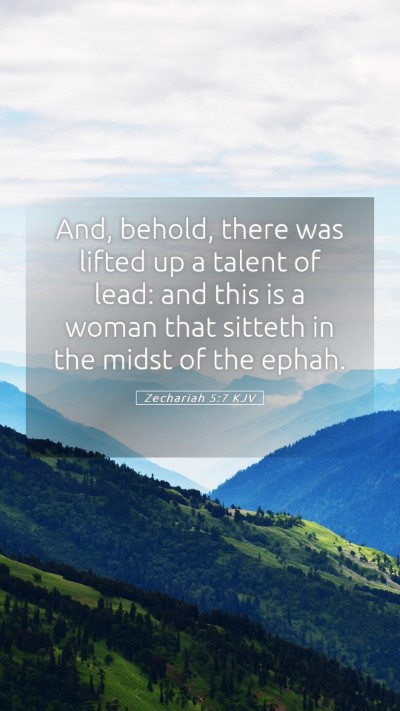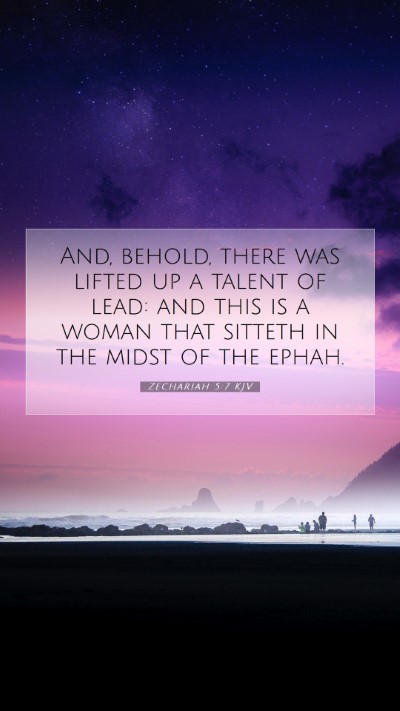Old Testament
Genesis Exodus Leviticus Numbers Deuteronomy Joshua Judges Ruth 1 Samuel 2 Samuel 1 Kings 2 Kings 1 Chronicles 2 Chronicles Ezra Nehemiah Esther Job Psalms Proverbs Ecclesiastes Song of Solomon Isaiah Jeremiah Lamentations Ezekiel Daniel Hosea Joel Amos Obadiah Jonah Micah Nahum Habakkuk Zephaniah Haggai Zechariah MalachiZechariah 5:7 Meaning
What is the meaning of Zechariah 5:7?
And, behold, there was lifted up a talent of lead: and this is a woman that sitteth in the midst of the ephah.
Zechariah 5:7 Bible Verse Meaning
Understanding Zechariah 5:7
Zechariah 5:7 provides a vivid picture through symbolism, highlighting themes of sin, judgment, and accountability within the context of God's sovereignty. To uncover its meaning, we draw upon insights from various public domain commentaries. This passage can be particularly enriching for those seeking Bible verse meanings and Bible verse interpretations.
Verse Content
Zechariah 5:7 (KJV): "And, behold, there was lifted up a talent of lead: and this is a woman that sitteth in the midst of the ephah."
Verse Explanation
This verse is part of a vision that Zechariah experienced, which includes the appearance of a flying scroll and a woman in a basket, symbolizing wickedness. The use of the "ephah" represents commerce and balance, suggesting that God's judgment extends to economic practices.
Insights from Matthew Henry
According to Matthew Henry, this verse illustrates that sin (represented by the woman) is being contained. The "talent of lead," Henry explains, symbolizes the heaviness of sin, which God weighs in judgment. The positioning of the woman in the ephah suggests that sin is not only national but also personal, affecting individual lives.
Insights from Albert Barnes
Albert Barnes elaborates on the significance of the lead and the woman. He notes that the weight of lead signifies the posture of sin being placed under judgment, indicating God's authority to address wrongdoing. Moreover, the woman is depicted as being encapsulated, demonstrating God’s intent to eradicate wickedness from the community.
Insights from Adam Clarke
Adam Clarke emphasizes the symbolism of the "lead" as a means to repress evil. He suggests that the actions in this vision are a prelude to the eventual purification of the people of Israel. Clarke’s interpretation invites readers to ponder the broader implications of God’s justice over sin in both a historical and a personal context.
Theological Implications
Combining insights from these commentators, several theological themes emerge:
- Accountability to God: The passage calls attention to the fact that no one is above God's judgment.
- Judgment of Wickedness: It reflects God's determination to rid His people of sin.
- Symbolism of Purity: The vision ultimately points toward the cleansing of God's people.
Related Bible Cross References
- Isaiah 5:20: "Woe unto them that call evil good, and good evil; that put darkness for light, and light for darkness."
- Revelation 18:2: "And he cried mightily with a strong voice, saying, Babylon the great is fallen, is fallen, and has become the habitation of devils."
- Proverbs 11:1: "A false balance is abomination to the LORD: but a just weight is his delight."
Applying the Verse Today
For those engaging in Bible study lessons or seeking a deeper Bible study explanation, this verse encourages reflection on personal and societal ethics. It challenges us to confront the 'wickedness' within ourselves and the communities in which we live, underscoring the importance of integrity and righteousness.
Conclusion
In conclusion, Zechariah 5:7 is a profound reminder of the gravity of sin and the necessity of divine judgment. The insights provided by renowned commentators enhance our Bible verse understanding and open avenues for in-depth Bible verse analysis. By studying passages like this one, believers can gain clarity on God's expectations and the consequences of turning away from righteousness.
For those exploring the significance of this verse, consider how it informs your daily life and interactions. Engaging in online Bible study or using Bible study tools can facilitate a deeper exploration of these themes and their relevance today.


